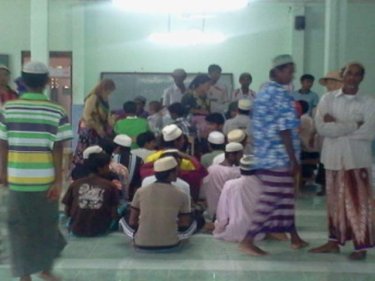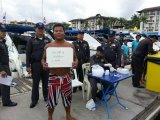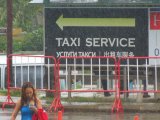PHUKET: More than 100 bedraggled Rohingya appeared mysteriously out of the jungle in a province close to the border between Thailand and Malaysia today.
The arrival of disheveled groups at a mosque in Songkhla prompted speculation that there must have been a falling out among human traffickers.
Although hundreds of Rohingya were ''rescued'' by Thai authorities in raids on traffickers' camps in January, the human trade across the border is known to be continuing.
With a boatload of more than 200 Rohingya washed ashore at a beach in nearby Satun province yesterday, the Thai authorities have a growing problem in determining what to do with increasing numbers of unwanted boatpeople.
When the Rohingya descended from the hills today, no translator was available to interpret and explain their sudden appearance to the imam at the mosque in the village of Chalung.
Villagers fed and clothed the men and boys, one as young as 10, before local police arrived to also puzzle over why they came to be there, and what to do with them.
By sundown, the number of Rohingya coming down from the jungle totalled 160 and was still growing.
Elsewhere, other Rohingya being held captive in Thailand were seeking a place to hide after breaking free from a cell at a police station at Takuatung, on the road between Phuket and Phang Nga Town.
Thirteen men made the break overnight. By this afternoon, five had been recaptured. It was thought the other eight may have commandeered a local longtail boat to flee to sea.
Their escape followed within 24 hours the escape of another 28 Rohingya from an Immigration detention in Songkhla, the province where police and villagers were puzzling this afternoon about the Rohingya descending from the jungle.
What will happen to them is uncertain. The boatpeople washed up yesterday at Satun's Rawai beach were still waiting nearby at a village in the Tungwa district to be collected.
Local police said the Army's Internal Security Operations Command was coming to fetch them, but Isoc officers had yet to arrive as night was falling.
The continuing escapes, the washing up of more boatloads and today's mysterious appearance of hundreds of men and boys from the hills is compounding Thailand's Rohingya conundrum.
Thai authorities, having interrupted the trafficking stream in which Rohingya arriving from Burma have been almost traditionally traded at a price through Thailand to Malaysia, now possesses more than 2000 unwanted men, women and children in its care.
Escapes by dozens of Rohingya had reduced the original number of 2200 being held in March substantially. But now the tally is likely to stop shrinking and grow instead, and it will grow rapidly.
Yesterday's boatload was merely the first of scores of flimsy vessels expected to put to sea from Burma (Myanmar) between now and April, the so-called ''safe'' sailing season.
Burma's campaign of ethnic cleansing and repression against Muslims in Rakhine state is likely to continue, enlarging the social and ethical dilemma for Thailand and its neighbors in Asean, the regional group that Burma will chair next year.
The arrival of disheveled groups at a mosque in Songkhla prompted speculation that there must have been a falling out among human traffickers.
Although hundreds of Rohingya were ''rescued'' by Thai authorities in raids on traffickers' camps in January, the human trade across the border is known to be continuing.
With a boatload of more than 200 Rohingya washed ashore at a beach in nearby Satun province yesterday, the Thai authorities have a growing problem in determining what to do with increasing numbers of unwanted boatpeople.
When the Rohingya descended from the hills today, no translator was available to interpret and explain their sudden appearance to the imam at the mosque in the village of Chalung.
Villagers fed and clothed the men and boys, one as young as 10, before local police arrived to also puzzle over why they came to be there, and what to do with them.
By sundown, the number of Rohingya coming down from the jungle totalled 160 and was still growing.
Elsewhere, other Rohingya being held captive in Thailand were seeking a place to hide after breaking free from a cell at a police station at Takuatung, on the road between Phuket and Phang Nga Town.
Thirteen men made the break overnight. By this afternoon, five had been recaptured. It was thought the other eight may have commandeered a local longtail boat to flee to sea.
Their escape followed within 24 hours the escape of another 28 Rohingya from an Immigration detention in Songkhla, the province where police and villagers were puzzling this afternoon about the Rohingya descending from the jungle.
What will happen to them is uncertain. The boatpeople washed up yesterday at Satun's Rawai beach were still waiting nearby at a village in the Tungwa district to be collected.
Local police said the Army's Internal Security Operations Command was coming to fetch them, but Isoc officers had yet to arrive as night was falling.
The continuing escapes, the washing up of more boatloads and today's mysterious appearance of hundreds of men and boys from the hills is compounding Thailand's Rohingya conundrum.
Thai authorities, having interrupted the trafficking stream in which Rohingya arriving from Burma have been almost traditionally traded at a price through Thailand to Malaysia, now possesses more than 2000 unwanted men, women and children in its care.
Escapes by dozens of Rohingya had reduced the original number of 2200 being held in March substantially. But now the tally is likely to stop shrinking and grow instead, and it will grow rapidly.
Yesterday's boatload was merely the first of scores of flimsy vessels expected to put to sea from Burma (Myanmar) between now and April, the so-called ''safe'' sailing season.
Burma's campaign of ethnic cleansing and repression against Muslims in Rakhine state is likely to continue, enlarging the social and ethical dilemma for Thailand and its neighbors in Asean, the regional group that Burma will chair next year.




















